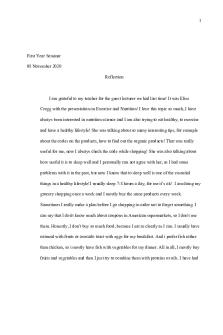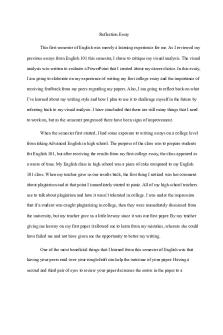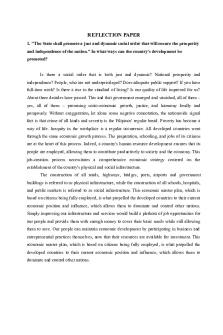Reflection - Grade: B+ PDF

| Title | Reflection - Grade: B+ |
|---|---|
| Author | Jay Dee |
| Course | Acute Care Nursing 1 |
| Institution | Australian Catholic University |
| Pages | 2 |
| File Size | 85 KB |
| File Type | |
| Total Downloads | 16 |
| Total Views | 203 |
Summary
GOOD INFORMATION...
Description
As the interviewer from the motivational interviewing video. I tried to use open ended questions, affirmations and reflect as well. Motivational interviewing skills assessment tool indicates, the interviewer employs the OARS of motivational interviewing. I introduced myself to my client but I felt I needed to be dressed well for the occasion. Reflective listening is fundamental to motivational interviewing. Summary reflections help steer the client based conversation toward evoking self-efficacy and hope. Motivational interviewing reframes the concept of the resistant client to that of a client engaging in sustain talk (versus change talk). It was developed to evoke change talk from sustain talk. Motivational interviewing evokes hope, self- efficacy (Miller & Rollnick, 2013, pp. 212-213, 220).
The Decisional Balance Worksheet is a tool for fully considering a possible change. It’s inlaid with another scaling tool that the authors present for recognizing the importance or lack thereof that a client may present (p. 213).
Reflective listening reflects the BUTs in a client’s conversation. People are more likely to be persuaded by what they hear themselves say (p. 34). It requires practice to become fluent and fluid in reflective listening, so that reflection is smooth, natural and on point. Reflective listening is fundamental to the four processes of MI: Engaging, the relational foundation, and the first of four fundamental processes in motivational interviewing, the process of establishing a mutually trusting and respectful helping relationship to collaborate toward agreed-upon goals. Focusing, guiding the client to a target behavior that is important to them. It involves clarifying a particular goal or direction for change. Evoking, eliciting or drawing out the client’s inner motivation (reasons/importance for change) and their own ideas for change. And, Planning involves collaborating with the client to develop a specific plan for change that the client is committed to implementing (pp.25- 32).
Motivational interviewing is beneficent to the client, not the counselor. Their needs have priority. Therapy embraces natural processes of change. Change is unquestionably selfchange. Clients are the experts about themselves. We can’t make change happen; neither can we come up with all the best ideas. Our ideas probably are not the best ones. MI evokes a client’s inherent strengths, motivations and resources that are vital for change to happen. It
requires a collaboration to determine what a client’s expert perspective is regarding what is needed to accomplish a change. It’s not a power struggle. It’s a waltz (dancing), not a wrestling match. Motivation is already there. It is evoked—called forth--not instilled. The goal for change is not a goal until the client adopts it (pp. 22-23).
Motivational interviewing is a person-centered counseling style for addressing the common problem of ambivalence about change. It is a collaborative, goal oriented style of communication with particular attention to the language of change. It is designed to strengthen personal motivation for and commitment to a specific goal by eliciting and exploring the person’s own reasons for change within an atmosphere of acceptance and compassion (p. 29).
Motivational interviewing inhabits “an attitude of profound acceptance of what the client brings” (p. 16). This does not mean that a counselor is compelled to necessarily approve or acquiesce. As the diagram at left illustrates, acceptance involves a four dimensional rubric with absolute worth at the top. It recognizes a fundamental trustworthiness of the client without qualifiers. It seeks to know the individuality of the client in order to evoke their own self-efficacy (pp.16-17). It is reflected to the client in accurate empathy as communicated by reflective listening.
Motivational interviewing is about guiding a client toward a choice for change (p. 231). Nonetheless, there are times when it is appropriate for a counselor not to judge a client’s choice in one particular direction, a person contemplating a divorce for example. This is a choosing to counsel with neutrality. Equipoise helps a client to make an informed decision without coercion.
Equipoise or neutrality is not a personality or character trait of the counselor. It is directed toward making a decision (pp. 241-242). It reflects that the counselor will support the client in whichever choice that they choose.
Miller, W.R., and Rollnick, S. (2013). Motivational interviewing: Helping people change (3rd ed.). New York, NY: Guilford Press....
Similar Free PDFs

Reflection - Grade: B+
- 2 Pages

Reflection #2 - Grade: B
- 3 Pages

Reflection 5 - Grade: b
- 1 Pages

Whiddon Reflection B
- 4 Pages

Engwr #4- B - Grade: B
- 7 Pages

Reflection Essay - Grade: A
- 2 Pages

Final Reflection - Grade: a
- 3 Pages

Reflection 2 - Grade: A+
- 2 Pages

Reflection nutrition - Grade: A
- 3 Pages

Midterm Reflection - Grade: 95
- 2 Pages

Reflection - Grade: A
- 5 Pages

Reflection essay - Grade: A
- 3 Pages

Reflection Paper - Grade: 100%
- 3 Pages

Reflection Journal - Grade: A+
- 2 Pages

Critical Analysis - Grade: B
- 6 Pages

Florida Consent - Grade: B
- 3 Pages
Popular Institutions
- Tinajero National High School - Annex
- Politeknik Caltex Riau
- Yokohama City University
- SGT University
- University of Al-Qadisiyah
- Divine Word College of Vigan
- Techniek College Rotterdam
- Universidade de Santiago
- Universiti Teknologi MARA Cawangan Johor Kampus Pasir Gudang
- Poltekkes Kemenkes Yogyakarta
- Baguio City National High School
- Colegio san marcos
- preparatoria uno
- Centro de Bachillerato Tecnológico Industrial y de Servicios No. 107
- Dalian Maritime University
- Quang Trung Secondary School
- Colegio Tecnológico en Informática
- Corporación Regional de Educación Superior
- Grupo CEDVA
- Dar Al Uloom University
- Centro de Estudios Preuniversitarios de la Universidad Nacional de Ingeniería
- 上智大学
- Aakash International School, Nuna Majara
- San Felipe Neri Catholic School
- Kang Chiao International School - New Taipei City
- Misamis Occidental National High School
- Institución Educativa Escuela Normal Juan Ladrilleros
- Kolehiyo ng Pantukan
- Batanes State College
- Instituto Continental
- Sekolah Menengah Kejuruan Kesehatan Kaltara (Tarakan)
- Colegio de La Inmaculada Concepcion - Cebu